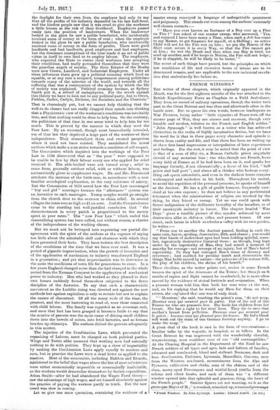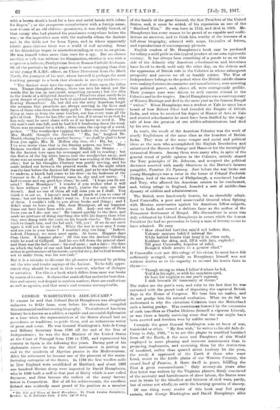FRENCH WINDOWS..
THE writer of these chapters, which originally appeared in the Month, was for the first eighteen months of the war attached to the British Expeditionary Forte as Chaplain to a Field Ambulance. They form no record of military operations, though the writer took part in the Great Retreat and was then and afterwards often in the battle zone. But to quote his own words, however inadequate as War Pictures, being rather " little vignettes of Peace torn off the sterner page of War, they are sincere and reverent, though very humble and modest, tributes to the French and English soldier." " John Ayacough " is well known as a writer who has achieved distinction in the realm of highly imaginative fiction, but wo have his word for it that in those pages every character and episode is drawn from reality and life, and that there has been no writing up
of these first-hand impressions or interpolation of later experiences and feelings. For the rest, it may be noted that the point of view is that of a man of fifty-six, a Roman Catholic priest aingnlarly devoid of any sectarian bias ; one who, though not French, loves every field of Franco as if lie had been born on it, and speaks her language Suently, if not idiomatically ; a lover of his kind, " half priest and half poet"; and above all a thinker who looks at every- thing sub specie acternactia, and even in the darkest hours remains undismayed and unshaken in his faith. Throughout his recital, to avoid the repetition of the personal pronoun, he speaks of himself as the Ancient. Ho has a gift of gentle humour, frequently exer- cised at his own expense ; he does not believe in any preferential treatment when the ministrations of religion are invoked by the dying, be they friend or enemy. Yet no one could speak with fiercer indignation of the deliberate brutality of the invaders, or of their monkeyish industry in havoc. Tho chapter headed "War Dogs " gives a terrible picture of this equator achieved by mere destruction alike in chtfiraux, villas, and peasant homes. Of one street, each house in which overlooks a valley with its own garden, he writes i- " From one to another the Ancient passed, finding in each the same ruin, havoc, spoiling, desecration, filth, and shame ; you would say that Lands of malevolent apes had boon holding spiteful, sense- less, ingeniously destructive Carnival there as though, long kept under by the superiority of Man, they had seized a moment of anarchy for revenge—not revenge of an injury, but of Man's hated superiority. So they had outraged Man's sense of decency and reverence ; bad marked for peculiar insult and- desecration the things Man holds sacred Ly nature—the privsrios of his women-folk, the play of his children, the shrine of his hearth."
These devilries, as the writer points out, revive in some French women the spirit of the triaXeuses of the Terror ; but though Bush results of rapine and flight cannot be overlooked, he is more often moved by the evidence of stoical fortitude and resignation. Whoa a peasant woman told him that both her sons were at the war, and, on his replying that he would say Mass for them on their return, she explained That one was already dead, " ' Monsieur,' she saki, touching the priest's arm, ' do not weep.
Heureux roux qui nteurcnt pour ha parie. Out of the soil of this Franco we who are peasants live. She feeds her children from her breast. She has a right to her sons' lives. They die to save that mother's breast from pollution. Heureux ceux qui racurent pour
will : heureux cam qui pieurent pour ice braces. Sly lad's blood
l wash out the stain of one German footstep anyway. I go to make the soup.'"
A great deal of the book is cast in the form of conversations— familiar talks by the wayside, in hospital, or in billets. In the Great Retreat he was impressed with the wonderfully cheerful, unquestioning, oven confident tone of our " old conternptibles." At the Clearing Hospital in the Department of the Nord he saw French soldiers of all types and ages, lads and fathers of families, educated and uneducated, blond and stalwart Hormone, dark and lean Southerners, Parisians, Lyonnais, Marseillais, Gaseous, men from the Western sea-board, mountaineers from the Alps and Pyrenees, cultivator. and clerks, sons of the cluilsou and of the slum, merry-eyed Proveneaux and wistful-faced youths from the solemn and silent !nudes, and each of them was " a different window opened into that splendid and gracious thing, the heart of the French people." Sinister figures are not wanting, sun as the grotesque Mayer of M.," a crooked, crunched-up, weaselled personage
• Pasch Windows. By John Aysootch. London : Edward Anndd. 15r. act.! with a brawn death's bead for a face and awful hands with talons for fingers"; or the prosperous manufacturer with a foreign name, now tenant of an old driteau—pensioners, it was darkly hinted, of that enemy who hod planted his pensionora everywhere before the war ; or the inquisitive man with the umbrella whom the Ancient met in the fields nut for from Ypres, and in whose apparently idiotic gesticulations there was a world of evil meanings Some of his friendships began in miounderstanding, or even in eat-spit-ion. Ho was himself taken snore than once for a spy. But no chance meeting or talk was without its illuminationotthother it was with a wept is or a believer, Presbyterian Scot or Roman Catholic Irishman. Of all t he portraits in these pages none is more engaging than theef of the young R.A.M.C. officer, an Ulster Protestant from the Black North, the youngest of his unit, whose farewell is perhaps the most touching passage in a book that abounds in moos ing incidents :-
The Ancient went into the copse and sat down upon the fallen tree. Truant•thoughted always. there ran into his mind, not the words (for he has an =textual, =quoting memory) but the ides in the words of a delightful American 'Preachers must surely he in great danger of perishing for lack of spiritual instruction, from only hearing themselves.' All, but did not the witty American forget the sermon. that preachers are always] meeting in the lives and- faces of those who cross t heir daily path ? One cannot learn every- thing at once or from the same teacher, nor has every man all the gifts of God. Those he has (the one he has, if it seems to us that Ire Las only one) he most share with us if we Imow we need it. The old man's cart was full, and he hart led it lumbering clown the road. There was no sound for a while ; then came the rap-tap of a wood• p]weceker. '" The woodpecker tapping the hollow elm tree," observed Mrs. Mould,' thought the Ancient. "'Ha, ha," laughed Mr. Mould, elosinghis eyes in a perfect luxury, " we shall be glad to hear from you again, Mrs. M. Hollow elm tree, eh ! Ha, ha. . . . I've aeon worse than that in the Sunday papers, my love." How Dickens revelled in undertakers—the Moulds, the Orams. . So the Ancient tore open his anewspaper and fell to reading but the flutter of the big white leaves sent the woodpecker away, and there was no sound at all. The Ancient was reading of tho Dardan- elles; but in his thoughts Chutney was gently moving, and hie smile looked out between the printed words. On the night which west= last before the Ancient left the unit, just as he was beginning to =dram, a knock had come to his door—in his bedroom at the Convent in St. J., and Chutney came in, airy and not merry. ' I had to come and say goodbye alone,' he said.. ' I hope you do not mind ? Dear Monsignor ! I wonder if you realize what it will be here without you I if you don't, you're the only one that doesn't. And no one of them all will miss you as I shall. You think it is not so. I haven't seen half as much of you as come of them : but not because I didn't want to. I'm not so clever as some of them. I couldn't talk to you about books and things ; and I didn't want to bore you. But, dear Monsignor, all my happiest times out here have been with you. Alt And—not one of them loves you as 1 do—not one.' He turned quickly to the door, and made no pretence of doing anything else with his fingers than what they were doing with the tears on his boyish cheeks. The Ancient tried to thank him, and I he lad said, ' Oh, yes ! If we do not meet again it will not be my fault. When the war is over may I come and Bee vou in your home ? I wouldn't stay too long.' Indeed, indeed, Chutney, we most meet again. At home. Happier days than these. A happier place.' Of this was the Ancient thinking. while he read of Gallipoli. And his eye fell down the printed sheet and there was the lade name ; his real name and a date : the date. on which the baby of our unit had attained his majority—killed in action in performance of his heroic, merciful duty, for to heal wounds, not to metre them, was his woe-task."
But it is a mistake to discount the pleasures of perusal by picking out the wise and tender sayings of the Ancient. To bo fully appre- ciated they should be read in their context, whether of dialogue or narrative. For this is a book which differs from most war books by reason of its aim. It allows that amid all that makes for brut al i.e. lion and misery and despair in modern warfare, there are exult at ions as well as agonies, and that man's soul remains unconquerable.



























 Previous page
Previous page